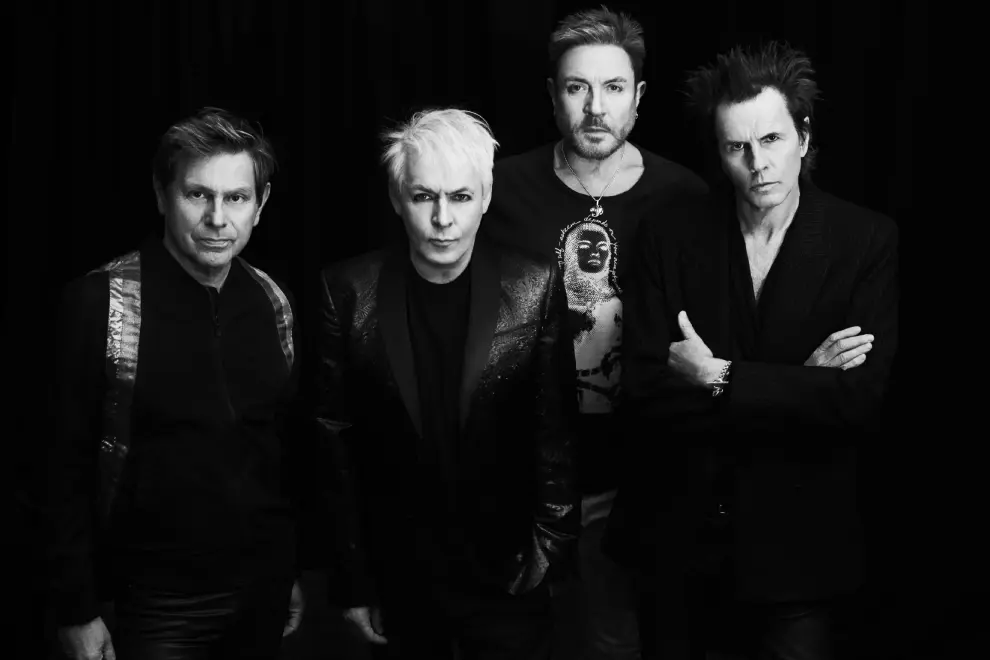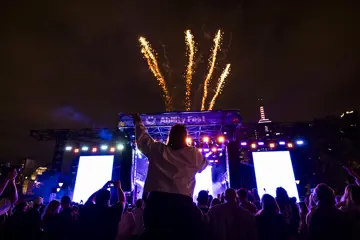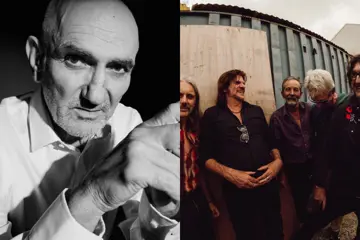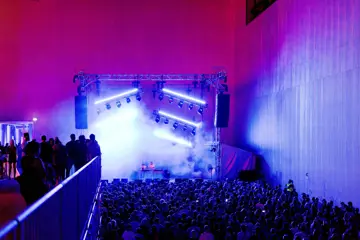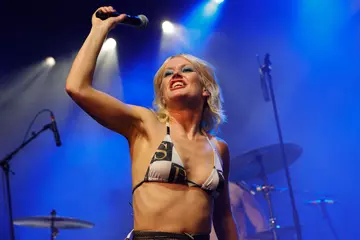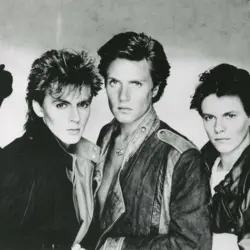 Duran Duran
Duran DuranThe British New Wave band Duran Duran have been savouring the most triumphant – and enduring – comeback in popdom, winning long overdue recognition for their musicianship, artistic innovation and cultural legacy.
Now, the 2022 Rock & Roll Hall Of Fame inductees have presented a carnivalesque covers album, DANSE MACABRE, summoning the spirit of the New Romantic age. Yet Duran Duran – currently frontman Simon Le Bon, keyboardist Nick Rhodes, bassist John Taylor and drummer Roger Taylor – refrain from exploiting '80s nostalgia. They're no heritage act.
The impetus for DANSE MACABRE was Duran Duran's Halloween spectacle in Las Vegas last year – the album was promoted as a Halloween party soundtrack. The band have reinterpreted thematic songs such as Billie Eilish's bury a friend, The Specials' Ghost Town, The Rolling Stones' Paint It Black, Siouxsie And The Banshees' Spellbound, and Talking Heads' Psycho Killer (featuring Victoria De Angelis, the bass-player from Italian Eurovision victors Måneskin). But, showing curatorial flair, Duran Duran likewise revisit their own "spooky" classics, plus unveil three originals – the LP's title track serving as lead single.
Ironically, Roger is conducting Australian interviews on Halloween, wrapping up a hectic schedule. "I'm very well – despite it being quite early in the morning for a musician," he greets drolly in his West Midlands accent.
Don't miss a beat with our FREE daily newsletter
Journalists typically clamour to interview a band's vocalist, but that was never the case with Duran Duran – all distinct identities. Curiously, it was Roger who was first seen in the video for Duran Duran's debut single, Planet Earth – bare-chested among clouds. The group's quietest member infamously quit at the peak of their '80s success, mythically retreating to South West England to farm. It didn't last.
"I live in London now – which I have done for a long time actually now," Roger reveals. "We just got back from a very good US tour, which was amazing. So we're just having some time at home now and enjoying the response we're getting for the new record, which has been pretty overwhelming. It seems to have been really accepted by the alternative world – which is amazing, really."
Duran Duran's line-up clicked in Birmingham in 1980 with Simon, Nick, John, Roger and the Geordie Andy Taylor (none of the Taylors are related). The band would be affiliated with the New Romantic movement, its local epicentre, the Rum Runner nightclub. Heavily influenced by David Bowie, Duran Duran developed cutting-edge synth-pop and cultivated a fantastic aesthetic with flamboyant (and androgynous) costumes and cinematic videos. Alas, punks (including journalists) dismissed New Romantics as 'poseurs'.
In 1981, the Brummie boys released their self-titled debut – the cheeky Girls On Film – a hit. The next year, they blew up across the Atlantic with the sleek Rio, advancing a Second British Invasion of the US actively supported by MTV and being hailed as pin-ups – Princess Diana a fan. Duran Duran consolidated their profile with the maximal Seven And The Ragged Tiger. "The Fab Five" recorded a James Bond theme, A View To A Kill. But the pressure was intense. Exhausted, Roger departed the band, followed by Andy – the latter eventually replaced by Warren Cuccurullo from California's Missing Persons.
The compact Duran Duran recast themselves. They amplified the funk on Notorious, recruiting Nile Rodgers – the Chic guitarist (and super-producer) initially remixing The Reflex. The band then embraced house on the wildly underrated Big Thing. In 1992, Duran Duran experienced a surprise resurgence with their epic single Ordinary World – the prelude to The Wedding Album. Still, the '90s were challenging, with Duran Duran on the periphery of grunge.
Duran Duran occasionally reworked others' material – Bowie an evergreen. In 1995, they dropped their inaugural covers collection, Thank You, Roger returning fleetingly to play on two numbers – one a haunting rendition of Lou Reed's Perfect Day that the American legend himself praised. The band also flipped rap tracks – Grandmaster Melle Mel's White Lines (Don't Don't Do It) and Public Enemy's 911 Is A Joke – as a nod to their Black Gen X fanbase. Regrettably, critics savaged it.
"For what it's worth, I thought it was a good album," Roger maintains. "But I think Duran Duran was in that kind of post-'80s era where everybody wanted to have a pop at them. Everybody wanted to bring them down. They couldn't do that with The Wedding Album because it was such an amazing piece of work that people couldn't criticise that too much.
"But, then, when Thank You came along, it was time to unleash the cannons – because it was treading on a lot of sacred ground. Some of the songs were quite ambitious projects to take on.
"I really enjoyed it because it was the first time I'd been back in the studio with the band since I left – so I've got fond memories of that record."
In the 2000s, Duran Duran finally received their dues. The five founding members regrouped to tour, culminating in 2004's rock-oriented Astronaut. And, though Andy subsequently quit a second time over creative differences, the band have sustained that momentum – linking with modish producers: Timbaland, Mark Ronson and Mr Hudson.
Celebrating their 40th anniversary, Duran Duran last ventured out with 2021's Future Past – this time working alongside Italian disco pioneer Giorgio Moroder and the UK DJ/producer Erol Alkan, architect of 2000s nu-rave (remember Late Of The Pier?).
Today, Thank You is a cult LP – and Duran Duran regularly performs White Lines. Nevertheless, DANSE MACABRE is a defiant manoeuvre, even if it's more a concept than a traditional covers album.
In many respects, DANSE MACABRE feels like a lost New Romantic opus with its subversive theatricality. In later years, the scene's impact has been reappraised – and American electro-popsters MGMT launched a micro-renaissance with 2017's Little Dark Age. But Roger considers DANSE MACABRE less a revival than an evocation of mood – the title a sardonic Middle Ages allegory about impermanence.
"We just wanted to kind of explore our darker side a little bit," he ponders. "There was something quite dark about the roots of the New Romantic movement, just the way that people dressed and the music they listened to was quite stark – like Kraftwerk and Berlin-era Bowie. So, I guess the movement was a little bit dark at the beginning. But we just really wanted to explore our darker side and have some fun with it – because it is a fun record as well; it's not all about doom and gloom.
"Things like BLACK MOONLIGHT [with Nile], they're dark, but they have a pop sensibility – which we always seem to slip into. We started thinking about [DANSE MACABRE] as a very dark piece. But, as usual, our pop sensibility gets involved, and it becomes something quite different – which is good, I think."
Hidden on Thank You is the original song Drive By, a sequel to Rio's avant-garde closer, The Chauffeur – and a harbinger of Duran Duran's self-referential approach to DANSE MACABRE with its gothic bangers. "People do love [The Chauffeur] – and that's one of the earlier dark pieces," Roger says. "We wanted to tap into that vibe with this record."
Indeed, the DANSE MACABRE curtain rises with a spectrally dramatic version of 1981's Night Boat. Duran Duran similarly reimagines Secret Oktober, the B-side to Union Of The Snake, and mash-up Rio's Lonely In Your Nightmare with Rick James' '80s funk Super Freak. "You tend to think, again, that these particular songs are sacred – especially with the fans," Roger observes. "They're almost like sacred ground. So I think it was quite brave to go back and kind of reopen those boxes and have another look at them."
Le Bon is rarely lauded for his expressive lyricism – Duran Duran's songs are often cryptic, Night Boat among them. Has Roger intuited their significance? "Generally, I think you can really go to your own interpretation," he demurs. "It's more like abstract poetry. Sometimes, it's hard to pin down a literal meaning. So it's really up to everyone to read whatever they want to, particularly into those early songs – because something like The Reflex was totally abstract, but it took on its own meaning for people."
Symbolically, for DANSE MACABRE, Duran Duran collaborated with their extended "family" – Andy and Warren, both "special guests". The reconciliation with Andy was bittersweet, the guitarist recently disclosing that he has prostate cancer. Roger speaks of his old bandmate with warmth and, understandably, discretion.
"We wanted to reunite with Andy for the Rock & Roll Hall Of Fame [ceremony], which unfortunately didn't happen. So we were immensely disappointed about that. That was gonna be a real moment for everybody. That was gonna be great. But that didn't happen. So the next best thing we thought was to get Andy back on this record – and it's been fabulous."
In 2023, Duran Duran are in a zone. Where does Roger envisage them going after DANSE MACABRE? "Well, it will be somewhere very different," he replies. "We like to constantly reinvent ourselves. We're very lucky that we can go down quite a few different avenues. We're not just a band that has to keep recreating the same sound.
"So I don't know where we'll go with the next record. We tend not to spend too much time analysing where we're gonna go. We'll have a general idea – and it's really what happens when we get together in the studio.
"But the great thing is, 40 years later, we get together in a room, and something really special always seems to happen. I think that's the key to our longevity. And, while that happens, we will continue."
Duran Duran are frequently quizzed about when they'll retire – rude. "I always say, 'I don't know the answer to that question because, if it's working – and it's working now – we'll continue.'" The Rolling Stones, who formed two decades before them, are still delivering buzz projects – an inspiration.
Duran Duran members have moonlighted. Nick later collaborated with Wendy Bevan on the Astronomia series of ambient techno volumes. Roger, too, has an interest in electronic dance music. In the '90s, he was in Freebass, airing a pumping tech-house remake of Sweet's Love Is Like Oxygen. The drummer even has a parallel career as a DJ, playing Ibiza's Pacha club in 2022.
"Yeah, I wouldn't call it a 'career', by the way," Roger laughs. "It's something I do as a side-project, which I started doing about 20 years ago. I got invited to DJ at a bar in London [The Met Bar]. I turned up with a bag of scratched CDs and started DJing, which I really enjoyed.
"But I said to my wife [Gisella Bernales], 'How did it sound?' She said, 'Oh, it was great, really good, but I didn't like the gaps in between the records' – 'cause I didn't [know how to] DJ really and, by the time I got the next song on, there was like a 30-second gap in the middle of the [set]. So, I then went on to learn to DJ properly. It's something I just really enjoy doing. I find it fun. I like to be in control of the music – and it's exciting. Yeah, I do love it."
Duran Duran's relationship with Australia began in the '80s (besides, the Aussie Russell Mulcahy directed their iconic videos). The band last toured in 2012. Rumours abound of a return – Roger keen. "We love coming to Australia," he enthuses. "When we come to Australia, it feels like home from home to us… It's something very much in our consciousness that we want to come back and play there. So hopefully, on the next round of touring, we'll come back down – because we do love it."
Roger needs to cut to a live radio interview but has time for a bonus question – his favourite cover of a Duran Duran song. Coincidentally, it's grunge. "Wow, I love Hungry Like The Wolf by Hole," he says. "Yeah, that's my favourite – brilliant. It's live – and I think it was a B-side or something. But that's a really cool cover."
Danse Macabre is out now via Tape Modern/BMG.

